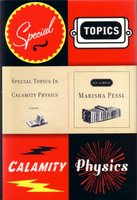 92. The Emperor’s Children, Claire Messud. Fiction , 10-22, pp. 431
92. The Emperor’s Children, Claire Messud. Fiction , 10-22, pp. 431 The Emperor’s Children, Claire Messud’s closely observed novel on the struggle for independence and identity, is the best book to emerge so far in 2006.
The Emperor is Murray Thwaite, a Maileresque journalist and author, of outsized ego and reputation. The children are Thwaite’s daughter, Marina, a some-time model and would-be author who has languished in her father’s shadow; Bootie, Thwaite’s brilliant, but misdirected nephew; and Danielle, a television producer and
The novel is seen through the eyes of all four characters as well as
Messud is a muscular writers who commands a reader’s attention. Her style of writing can quickly lead to confusion for any reader who allows his attention to wander. There can be a great deal of text between the opening and the closing of a dash. Yet this very demand for focus ultimately serves the reader well. It is on the second, or even third, pass that the depth of Messud’s observation is seen most clearly.
The climax of Messud’s novel comes with the events of 9/11. The introduction of 9/11 into the novel is unexpected, but appropriate and Messud – like Julia Glass in The Whole World Over – is satisfyingly successful in capturing the raw emotions of that day in which the perceptions of entire nation were shaken and altered, perhaps forever.
Late in the novel, after the towers have fallen, Danielle confronts the enormity of the tragedy in the most personal terms, because of the events of 9/11 have robbed her of her lover:
“She had seen the second plane, like a gleaming arrow, and the burst of it, oddly beautiful against the blue, and the smoke, everywhere, and she had seen the people jumping, from afar, specks in the sky, and she knew that’s what they were only from the TV, from the great reality check of the screen, and she had seen the buildings crumble to dust; . . . she had seen these things and had been left, forever, because in light of these things she did not matter, you had to make the right choice, you had to stay on the ground . . . you had to stay on the ground and there was no call to feel anything, there was nothing to feel because you weren’t worth anything to anyone, you’d had your heart, or was it your guts, or both, taken out, you’d been eviscerated . . . and now there was nothing but sorrow and this was how it was going to be, now, always.”
The Emperor’s Children is a splendid, powerful novel.








